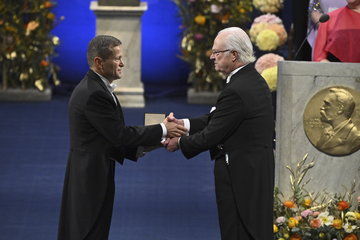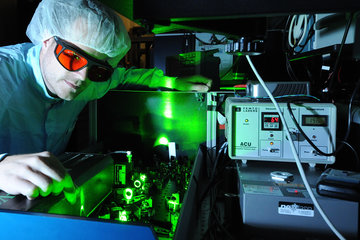Winfried Denk awarded the Kavli Prize in Neuroscience
One of the world’s most prestigious prizes awarded to Max Planck scientist
The Kavli Prize in Neuroscience, which comes with a prize fund of USD 1 million, has been awarded this year for the explanation of the fundamental neuronal mechanisms involved in perception and decision-making. Winfried Denk shares the prize with Cornelia Isabella Bargmann, Rockefeller University (USA), and Ann M. Graybiel, MIT (USA). The prize will be presented by the King of Norway on September 4th in Oslo.

Winfried Denk is renowned for his pioneering work on the development of new imaging methods. The Kavli Prize honours two of the methods he has developed, which have enabled scientists to answer questions about fundamental biological processes, for example how information from the eye reaches the brain.
Winfried Denk presented the two-photon laser scanning fluorescence microscopy method in 1990. This type of microscopy is far more protective of the tissue under examination than confocal laser-scanning microscopy, the most common method up till then. This meant that it became possible, for the first time, to look deep into scattering tissue for extended periods. This microscope improved the depth of penetration from 50-80 µm to up to 1000 µm (1mm). Thus, with its development, tissue layers became visible that could not previously be observed using imaging technology.
In the subsequent years, Winfried Denk developed a three-dimensional scanning electron microscope. This automated process presents the minutest details in the surrounding tissue in three-dimensions. To do this, an electron microscope scans the surface of a piece of tissue: the image obtained is saved. The device then cuts an ultra-thin slice of the tissue and records the tissue layer underneath it. All of the structures in the tissue block are then imaged section by section and combined on the computer to form a three-dimensional structure.
Both of the methods developed by Winfried Denk have enabled scientists to attain completely new insights into biological processes directly where they occur. This enables the in-depth investigation of these processes. Thus, both of the methods developed by Winfried Denk have revolutionised research based on imaging processes.
Winfried Denk (*1957) studied physics at Ludwig Maximilians Universität Munich and at the Swiss Federal Institute of Technology Zurich (ETHZ). He completed his doctorate at Cornell University, Ithaca, USA. He then worked at the IBM Research Lab in Rüschlikon, Switzerland, and in 1991 became director of an independent research group at Bell Laboratories in Murray Hill, USA. The physicist was appointed Director at the Max Planck Institute for Medical Research in Heidelberg in 1999, where he headed the Department of Biomedical Optics. Winfried Denk has also been honorary professor at the University of Heidelberg since 2002. He was recently appointed as Director at the Max Planck Institute of Neurobiology in Martinsried.
The Kavli Prize
The Kavli Prize honours scientists for pioneering research in the fields of astrophysics, nanoscience and neuroscience. The prize was established by Fred Kavli, the Norwegian scientist and philanthropist, and has a prize fund of one million US dollars. The prize is presented at an official ceremony in Oslo.
The Kavli Prize has been awarded to outstanding scientists every second year since 2008. It is organised by a partnership between the Norwegian Academy of Science and Letters, The Kavli Foundation and the Norwegian Ministry of Education and Research.












